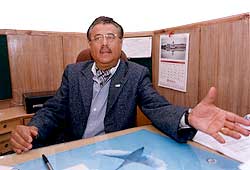Managing director of President Travels and Tours and General Sales Agent of the Gulf Air in Kathmandu, Bhola Bickram Thapa, doesn't mince words when talking about the challenges facing Nepal's tourism, especially now that the war in Iraq has begun. He also spoke to Nepali Times about things that need to be done for long-term tourism development.
 Nepali Times: What could be the impact of a US-led war against Iraq on our tourism industry?
Nepali Times: What could be the impact of a US-led war against Iraq on our tourism industry?
Bhola Bickram Thapa: The chief of the Gulf Air recently said that his airline would operate normally even during the period of war. But it is definitely going to create problems for our tourism. After the ceasefire, the Kathmandu-based embassies had changed their travel advisories, from "Don't Go" to "Use Caution". The attitude of international travellers has changed a lot over the last few years, but the number of Nepal-bound tourists from the US, Europe and Japan will be affected if war breaks out. The severity of its impact will depend on how long it lasts.
Is this going to negate the gains of the ceasefire announcement?
That remains to be seen. But we are very optimistic about the ceasefire and hold a positive attitude. It looks like the black clouds have finally moved away and one can see rays of hope. There have been signs of improvement after the ceasefire. The most important thing is that we are getting inquiries from overseas. This shows foreigners are interested to visit Nepal again. On our part, we have already sent messages saying that things have changed here. We are looking forward to better days ahead. But this does not imply that tourists will come back to Nepal in huge numbers that easily.
Have we been able to convey the message that Nepal is a safe destination?
People involved in the tourism industry have been trying to convey to the world that things are not bad as the media portrays. A Sri Lankan entrepreneur once told me that their media used to carry news saying so many people got killed and the location, which was 500 km away from Colombo, would be written almost as an aside. Such things happen everywhere. I do not mean to say that the media should not give facts and figures. They, however, should be very careful in presenting the information. Every hotel and travel agency in Nepal sent out information to their clients on the improvement of the situation.
So, what else do we need to do?
At the moment Nepal is being carefully watched by the outside world. People will scrutinise us for three to four months to see if the ceasefire holds. The good thing is that the ceasefire was announced at a time when tour operators were preparing their tour packages. Most of them had taken out Nepal, we had to convince them to put Nepal back in their list. They may not have 30-day programs but the possibility of three to four-day tours are still there. Our tourism industry has been constantly hit since the hijacking of the Indian Airlines flight in December 1999. But we always asked ourselves, "How bad can it get?"
Why is the tourism industry so sensitive?
The main reason is because we have not been able to develop Nepal as a tourist destination. We are still a side-trip. The focus has to be on developing Nepal as a destination. If people in Europe have three weeks holidays, they cannot fly to Nepal paying $2,000 for a four or five day trip. We also need to capitalise on man-made resources to exploit the opportunity. For this to happen, we have to focus on two things: first, focus on trekking and second, develop Kathmandu as a hub. For example, if tourists visit Nepal for three weeks they can also travel to places like Bhutan, Sikkim and Tibet for three to four days and come back to Nepal. For this we need to give multiple visas to tourists. Charging visa fees every time simply adds to their expenses. We also need to have many airlines flying to Nepal to sustain this activity. However, ground handling and other services at the airport are high, which increases the cost for airlines. If we could motivate airlines to market Nepal it would be better than billing them high service charges. We cannot afford the expensive promotional activities that they can.
How about other attractions besides trekking?
We have to change our marketing strategy. We must project something new to international travellers. How are we going to do this is another question. There have been a lot of trade fairs and other activities but we have not been able to get the right response. If we are going to market a country, we need to emphasise visuals, not words. We always depend on natural rather than on man-made resources.
How bad has the impact of insurgency been on the tourism industry as a whole?
The insurgency hit hard operations that had bigger infrastructures but everybody suffered to some degree. Larger tour operators cut down working hours and staff salaries as part of their cost-cutting measures.
Is there any way to pull RNAC out from the current mess?
There is a need to open a new, subsidiary company. We can rope in the private sector and float public shares. The traffic rights of RNAC are an asset that can be put in as its contribution to the new company. The company has to be run by private sector management. Although regulations governing RNAC cannot be changed overnight, we must be sincere in our efforts to pull the corporation out of its present mess. The main problem is none of the concerned government agencies work in unison. They blow their trumpets without the slight consideration to national interest. I believe that given a free hand, Nepalis can still manage our national flag carrier efficiently.


